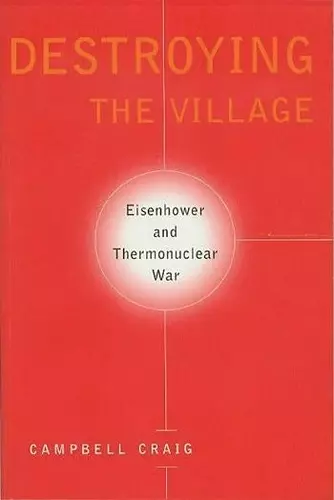Destroying the Village
Eisenhower and Thermonuclear War
Format:Paperback
Publisher:Columbia University Press
Published:2nd Jul '98
Currently unavailable, and unfortunately no date known when it will be back

Thanks to recently declassified government documents from the early Cold War era, Craig is able to investigate what America's strategists really thought about the viability of nuclear warfare. He demonstrates that even as they were publicly attempting to make nuclear war technically feasible, many Pentagon officials were privately pessimistic regarding any nuclear strategy. Craig probes the heated arguments Eisenhower had with his national security advisors, and shows how the president conspired to make the option of war with the Soviet Union impossible.
Using declassified government documents from the early Cold War era, this text demonstrates that even as they were publicly attempting to make nuclear war technically feasible, many American officials and leading policy makers privately rejected the feasibility of any nuclear strategy.In the early days of the Cold War, thermonuclear conflict was everywhere an imminent threat. With the realization that mutual destruction was the likely result of a nuclear war, US policy makers were forced to articulate a coherent stance on what they would do if the United States went to war with the USSR. The paradox of defeat or mutual annihilation was one that plagued American policy makers and scholars, whatever their stated position. Using declassified government documents from the early Cold War era, this text investigates what America's strategists really thought. It demonstrates that even as they were publicly attempting to make nuclear war technically feasible, many Pentagon officials and leading policy makers privately rejected the feasibility of any nuclear strategy. The author argues that by the late 1950s, the primary objective of the United States - though it was never voiced officially - was the avoidance of nuclear war. Craig examines the arguments Eisenhower had with his national security advisors, showing how he conspired to make the option of war with the Soviet Union impossible. The book explains how Eisenhower clashed a number of times with hardened diplomats and military officials pushing for war, in meetings that the public did not know of. This book explores in detail the various superpower disputes over Berlin and the Taiwan straits, and over NATO and the Cuban missile crisis.
The strength of this book is its marshaling of fresh material to support a bold interpretation of an important subject. Students of the Eisenhower years will have to take note of both the book and the author. -- H.W. Brands, Texas A&M University Journal of American History Campbell Craig does an impressive job of setting the historical record straight in his interesting and well-documented first book. -- Steven W. Hook, Kent State University H-Net Reviews This is a highly commendable study...It will be essential reading. -- Ian Jackson Journal of American Studies
ISBN: 9780231111232
Dimensions: unknown
Weight: unknown
240 pages